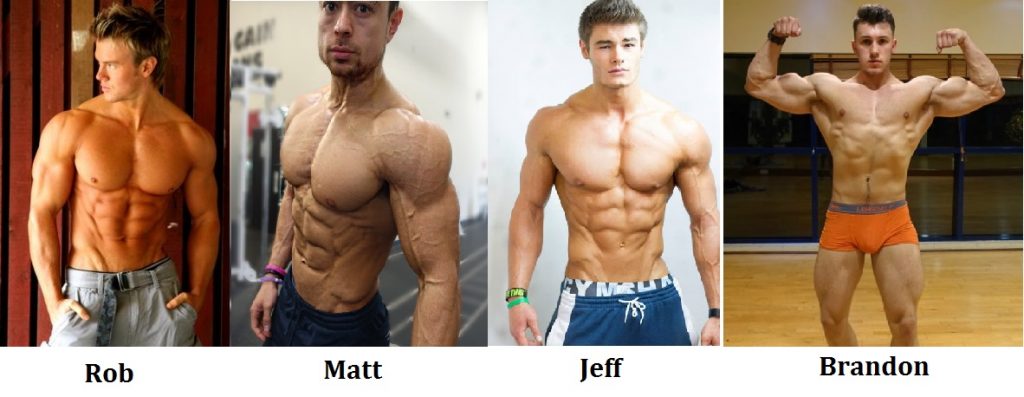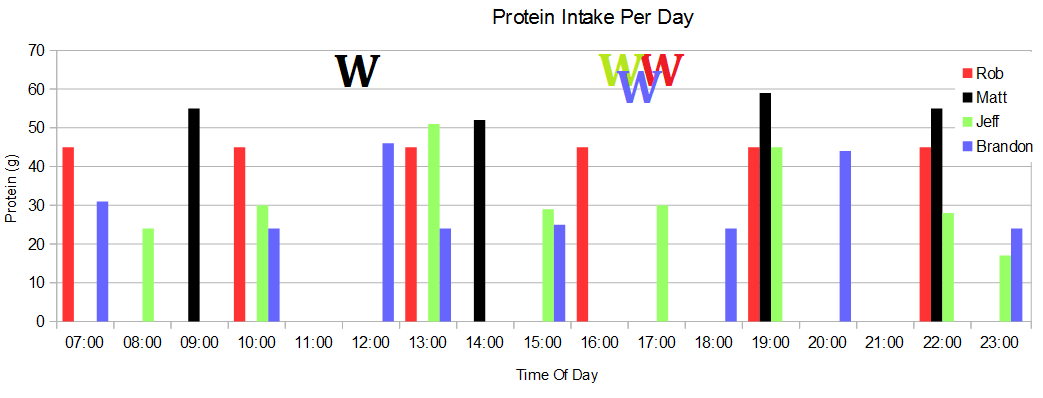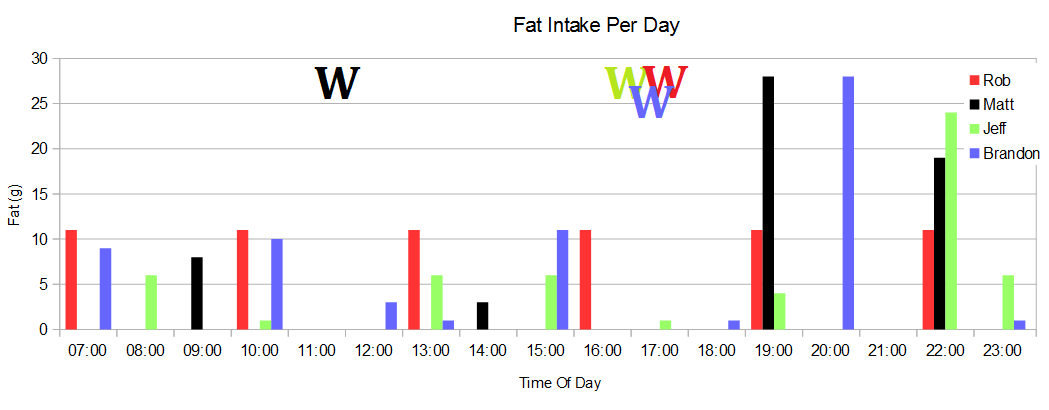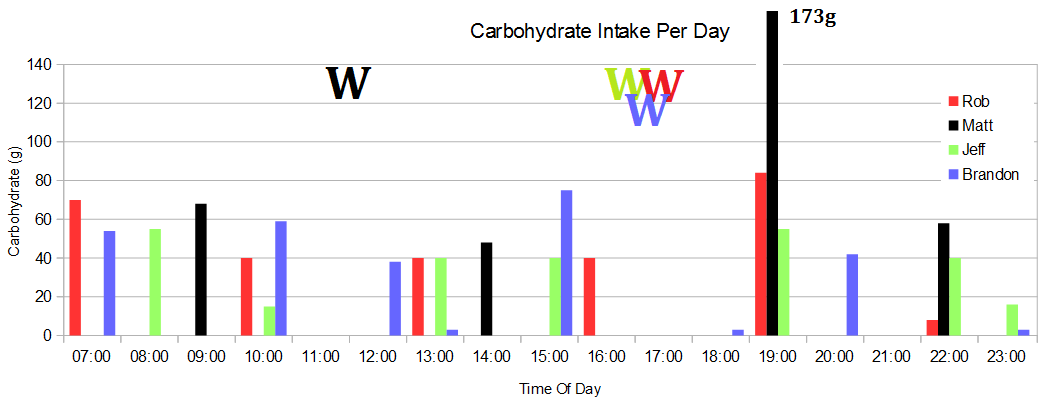Here you will learn all the basics for losing fat and gaining muscle.
If you want to gain muscle you need a calorie surplus, and below i’ve put the numbers I calculated for myself in Lesson 4.
Gym Day: Protein 150 – Carbs 390 – Fat 60 Calories 2700
Rest Day: Protein 150 – Carbs 260 – Fat 95 Calories 2500
Just to re-cap:
- Protein is 2 grams per kg bodyweight.
- Fat is 1 gram per kilo, but a little less on workout days and a little more on rest days.
- Carbs are however many you need to get your desired calorie total, which for me is about 300 calories above my maintenance level.
Your numbers might look different to this, as most people prefer a higher protein and slightly lower carb intake.
Nutrient Timing of Male Physique Models
I’ve searched online and found daily macros for four guys, which will help me outline the basic rules they follow. These guys are all between 80 and 90 kilos and consuming between 2600 and 3000 calories a day.

Just a heads up that their protein intake is quite high as I imagine they are all sponsored by supplement companies. Not only is cost not an issue for them, they’re likely being paid to take that much, or at least to say they do when they outline their diet.
They’re all in excellent shape and from their diets you’ll be able to see the main structure they follow.
Protein Timing
So protein for these guys is 220 to 270 grams per day, personally I think the low end is more than enough.
If you aren’t gaining muscle there’s a hundred reasons for that, and only one of them involves buying more protein powder.
You might have heard bodybuilders talk about eating six meals a day. One of the main reasons is because it’s generally a good idea to space your protein out across the day. To get maximal protein synthesis you need at least 20 grams of protein, and due to the rate you absorb it a good cap is about 45 to 50 grams of protein for the average guy.
You can see that with my comparatively small intake of 150 grams it only just fits into 3 square meals a day assuming i’m the top end of average. If I wanted to eat the same amount of protein at each meals, here’s how I could split it up:
- 6 meals of 25 grams
- 5 meals of 30 grams
- 4 meals of 37 grams
- 3 meals of 50 grams
So let’s see how our four guys fit 200g+ of protein into their days.

Rob: Eats 45 grams of protein every 3 hours, working out at 5pm.
Matt: Eats 55 grams every 4 hours, working out at 12pm.
Jeff: Eats 8 smaller meals with the most protein at 1pm and 7pm, working out at 4.30pm.
Brandon: Eats 8 smaller meals with the most protein at 12pm and 8pm, workout out at 5pm.
In terms of what you can do, that depends on your schedule. If you work a 9 to 5 office job you probably don’t want to be eating six meals a day.
If you’re looking to have four meals you could do breakfast, lunch, dinner and after your workout. Five meals, maybe add a mid-morning or mid-afternoon snack. Remember to aim for 25 to 45 grams of protein per meal.
Fat Timing
In terms of guidelines I think as long as your total is right, it’s just whatever feels right for that meal. Your post-workout meal might be a protein shake which is minimal fat, so the fat gets split among the other meals.
These guys are very aligned, with between 54 and 66 grams of fat on gym days. Let’s see how they fit that in.

Rob: Eats 11 grams of fat every 3 hours.
Matt: Eats nearly all his fat in the two meals at the end of the day.
Jeff: Eats a large portion of fat in his evening meal.
Brandon: Eats some fat through the day but the largest portion in his late evening meal.
Again the pattern seems to be to get more fat later in the day, and to keep under 1 gram per kg of body-weight.
Carbohydrate Timing
When I did my degree (2010) the guideline was to put 75% of your carbs around your workout, but a lot of the science has progressed since then. In order to gain muscle effectively it’s a good idea to spike insulin (by eating carbs) in the morning and after your workout. Let’s see when these four guys consume their carbohydrates.

Rob: Eats carbs at every meal, with the highest intake early morning and after his workout.
Matt: Eats a very high carbohydrate meal in the evening, several hours after his workout.
Jeff: Eats a good portion of carbs at five meals, with the most early morning and after his workout.
Brandon: Eats a good portion of carbs at five meals, with the most before his workout.
You can see that those who were eating eight meals a day were having protein shakes for a few, and only had carbohydrates at five meals. Matt is an anomaly, consuming a huge portion of carbs in the evening, while the others stick to 40-80 grams per meal.
What works for you will depend on your schedule and the foods you have available at each meal. You will be much more likely to stick to an eating plan if it’s convenient and easy to follow.
A Quick Recap
- Eat between 25-45g of protein at each meal, spread evenly across the day
- Fats can be spread out or skewed towards the end of the day
- High carb meals should be Breakfast and Post-Workout, beyond that try 40-60g at other meals.
Thanks for reading, please SHARE with anyone you think might be interested in this article.
Lesson 6 covers insulin and the glycaemic index. Your level of insulin sensitivity dictates how well you can turn the carbohydrate you eat into muscle instead of fat.

